C - Organized Mobbing
C - Organized Mobbing
C - Organized Mobbing
You also want an ePaper? Increase the reach of your titles
YUMPU automatically turns print PDFs into web optimized ePapers that Google loves.
contrast, meaningful employment offered at least some leverage for<br />
vention. Time was also restricted on a smaller scale. The Stasi tried to keep<br />
from getting vacation time granted for days of planned apt. Ions or for<br />
the attendance of meetings in other cities. Another way to limit time availability<br />
was to let groups slide into excessive self-politics. Security concern<br />
SOr<br />
tactics could potentially be discussed ad nauseam. Secret informants could<br />
delay the completion of tasks they wereassigned. Activists were at times busied<br />
by yet other means. Stasi would place ads in periodicals in the name of<br />
a dissident with the offer to buy or sell particular kinds of goods with the<br />
effect that the targeted activist had to busy him or herself fending offbuyers<br />
or sellers on the phone or worse even, at the door. A variant of this measure<br />
consisted in ordering repairs the dissident never thought of undertaking.<br />
Space is as necessary as time to bring about action. After the party state's<br />
own performance venues became definitely closed to more critical programming<br />
after the Biermann denaturalization, the Stasi tried to dissuade activists<br />
from staging readings or concerts in their own apartments by fining them<br />
for the violation of city codes after repeated injunctions. Such fines could<br />
quickly reach the level of a monthly salary. The Stasi used the state's compact<br />
with the Protestant Church, as well as its network ofsecret informants among<br />
church officials, to induce local ministers to refrain from providing church<br />
spaces to dissident activities. Other resources that mattered were those the<br />
movement members needed to projectively articulate their actions, that is,<br />
especially means of communication and transportation but also the organizational<br />
capacities of the Protestant Church. As far as the technological<br />
means of communication are concerned, the Stasi had to balance two opposing<br />
rationales. On the one hand, severely curtailing dissidents' means<br />
of communication would have limited their ability to coordinate even such<br />
simple things as meetings. On the other hand, their use of telephones offered<br />
enhanced means of surveillance, more simple to carry out than, for<br />
example, bugging apartments. Apparently, the Stasi gave preference to the<br />
surveillance aspect and sometimes provided telephones to dissidents more<br />
quickly than to ordinary citizens. Stasi also monitored the personal correspondence<br />
addressed to activists. Knowing or at least suspecting comprehensive<br />
surveillance, they had to use personal couriers for important messages<br />
they did not want the Stasi to know anything about, or they had to<br />
begin encrypting what they transmitted via monitored channels. Finauy?<br />
the secret police attempted to constrain the physical mobility of activists. I<br />
mentioned that many peace and civil rights movement members could, from





